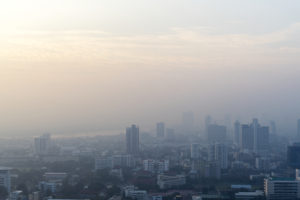
Lahore Smog Issue (Smog Laws for Punjab)
Smog is a major problem in the fields of Punjab and specifically in Lahore. The problem gets adverse in October and continues till March each year when air pollution increases due to low wind pressures resulting in poor air quality index resulting in smog. The laws, rules and policies are devised by the Government for tackling the smog issues and the major problem is perhaps implementation of these laws, rules and policies in its true spirit and regulate the actions/omissions of public functionaries to deal with such laws. The laws applicable in Punjab, Pakistan dealing with issues of air pollution and smog are discussed below:

Punjab Environmental Protection (Smog Prevention and Control) Rules, 2023 were made by Government of Punjab for purposes of curbing the issues of air pollution and smog in Punjab. The law focuses on brick kilns, industrial units, resource recovery units and tire pyrolysis plants in Punjab.
The Pakistan Environmental Protection Act, 1997 and Punjab Environmental Protection Act, 1997 are the basic laws which deal with all matters related to pollution including air, water and land. Pakistan Environmental Protection Act, 1997 is applicable all over Pakistan and the Punjab Environmental Protection Act, 1997 extends to whole of the Punjab. The acts define air pollutant, emission standards and pollution itself. The laws prohibit certain discharges of emissions, discuss the regulations of motor vehicle concerning air pollution and provide for environmental protection orders.
Pakistan Climate Change Act, 2017 is applicable to all over Pakistan. It pertains to change in climate system which is caused by significant changes in concentration of greenhouse gases as a direct or indirect consequence of human activities. The law defines emissions, greenhouse gases and constitutes an authority which shall work for mitigation of air pollution.
Pollution Charge for Industry (Calculation and Collection) Rules, 2001 pertains to industrial units in whole of Pakistan to control air pollution caused due to industrial smoke. The industrial air pollution and smoke are one of the causes of smog in Lahore and Punjab.
The [Punjab] National Calamities (Prevention and Relief) Act, 1958 pertains to whole of Punjab except tribal areas. The act contains provisions related to air pollution.
Punjab Environmental Protection (Motor Vehicles) Rules, 2013 extends to whole of Punjab. It prohibits to operate a motor vehicle from which air pollutants or noise are being emitted in an amount, concentration or level which is in excess of the environmental quality standards.
The Punjab Government has also devised a Policy and Action Plan for Control, Mitigation, Advisory and Protective Measures in Extreme Weather Conditions of Dense Smog in the Punjab, 2017, which is applicable to the whole of Punjab particularly in Lahore and its surrounding areas during the winter months. The Lahore High Court, Lahore has taken up the issues of smog and invoked the ‘precautionary principle’ which is an internationally recognized principle in environmental law. The principle encourages taking preventive measures when an action, policy, or activity might harm public health or the environment. The precautionary principle is reflected in the principle No. 10 of Rio Declaration, 1992 and provides that “where there are threats of serious or irreversible damage, lack of full scientific certainty shall not be use as a reason for postponing cost-effective measures to prevent environment degradation”. The Lahore High Court has emphasized to focus on promoting tree planting and green initiatives to address smog related environment concerns. The Court also emphasizes the importance of urban forestry based on international best practices. In respect of the pending petitions related to environment and in particular related to smog the Lahore High Court, Lahore has placed an on-going supervisory jurisdiction with judicial directions.